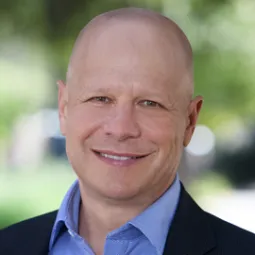There is a common thread to the work of Stanford Graduate School of Business finance professor Jonathan Berk, who studied physics before choosing his current field.
“What I bring to the field is this idea of taking a problem that people don’t really understand and looking at it in a different way,” he says. “Once you see it in this new way, what we see makes perfect sense. In fact, it’s what you would expect to find,” he says. In his primarily theoretical research spanning nearly three decades, Berk takes this approach to answer some fundamental, sometimes baffling, finance questions: Why do small stocks earn higher returns than large stocks? Why does the debt-to-equity ratio matter? Why, if mutual fund managers are actually skilled, don’t actively managed funds outperform passive funds? Berk recently spoke with us about what motivates him as a researcher, how his career might be different if he started today, and the importance of “thinking in equilibrium.”
What Drew Him to the Field
Before he started out in finance in the 1980s, he studied physics as an undergraduate at Rice University. “But I knew I didn’t want to be a physicist,” he admits. Instead, he started working at Goldman Sachs. “As a physicist, I was really drawn to the idea that you could model the world of economics with formulas,” he says. “So that’s what attracted me to the field of finance.”
His Most Influential Research
Berk was recently awarded the fifth Stephen A. Ross Prize by the Foundation for the Advancement of Research in Financial Economics for a 2004 study he coauthored with the late Richard Green of Carnegie Mellon University. That research was part of a series of papers in which Berk upended the idea that because active money managers, as a whole, do not outperform passively managed funds, they must not be skilled.
Berk’s research illustrated why it’s a mistake to use returns to judge a mutual fund manager’s skill. When an active mutual fund manager makes an above-market return, more people want to invest with that manager. But as the money flows into the fund, Berk points out, it becomes harder for the manager to keep earning above-market returns. For one thing, the available investment opportunities start to dwindle, and for another, it becomes more difficult to place trades in large enough quantities. “So the fund’s return starts going down,” he says. “Ultimately, the fund’s return will drop by so much that investors will no longer want to invest additional money in the fund. What point is that? It’s when the fund’s expected return equals the passive return, the market return.”
There is an accurate way to measure the manager’s skill, Berk says. “If I tell you I made a 100% return on one dollar versus a 10% return on a billion dollars, you’d rather have a 10% return on a billion dollars. It’s not the return you care about, it’s the amount of money the manager makes picking stocks; that is, the percent that the manager has beaten the passive strategy [his benchmark] before fees, multiplied by the assets under management.”
Looking at mutual fund managers in that light, Berk says, shows that they are in fact highly skilled — the average mutual fund manager generates over $3 million per annum picking stocks. “Investors know this, and they invest money precisely in a way to make sure that the returns of active equal the returns of passive. Unfortunately for investors, this competition ensures that they do not share in this value added. All the fruits of the manager’s labor accrue to the manager himself.”
What’s Next
Berk is writing a book that will use these money management questions as a springboard to explore what he calls “thinking in equilibrium.” To illustrate the concept, he points to field goal percentage in basketball. “You would expect that to be a good measure of a player’s ability,” he says. “It’s not. Michael Jordan is like 150th on the all-time list!” What happens in equilibrium is that defenses adjust, good players get double-covered, and bad players have an easier time scoring. The book, he says, will explore other areas where people don’t think in equilibrium and reach erroneous conclusions. “The layman’s term here is ‘holding all else equal,’ ” Berk explains. “We argue that you cannot hold all else equal. You’ll make big mistakes because in the world all else is not equal.”
Where He Might Focus If He Was Starting His Academic Career Today
“If I was starting out today, it’s not clear that I’d be a finance instructor, even though I love finance,” Berk says. Indeed, these days it’s the field of marketing where the most exciting research opportunities exist, he says. Just as finance was revolutionized in the 1950s and 1960s, marketing is experiencing a similar transformation today. “Marketing is in such a critical stage right now. You go from what was sort of this creative and intangible place to a world where everything is measurable. I think marketing in 20 years’ time will look like finance. Everything will be rigorous and analytical.”
The Person He Admires Most
Berk was born and grew up in South Africa, and as a teenager developed a deep admiration for Nelson Mandela. “He had a characteristic that I think only three human beings on Earth ever had, at least by my reckoning,” Berk says. “He voluntarily gave up power — and not just voluntarily gave up power, he voluntarily gave up power because he knew that if he didn’t, the result would be worse. The only two other people who have done that to my knowledge — and they’re also heroes of mine — are George Washington and Mahatma Gandhi.”
Where You’ll Find Him When He’s Not at Stanford GSB
“In one of two places — on my bicycle or on a ski slope in the mountains.”
Photos by Manuel Vazquez


